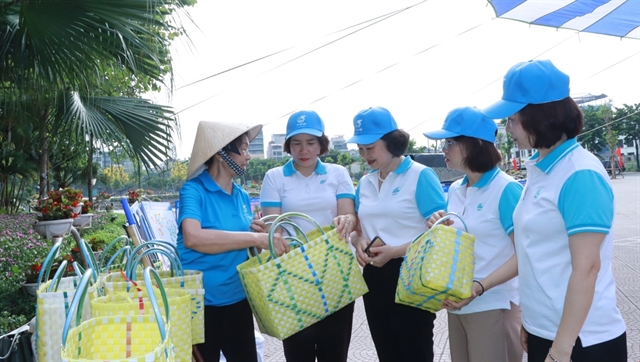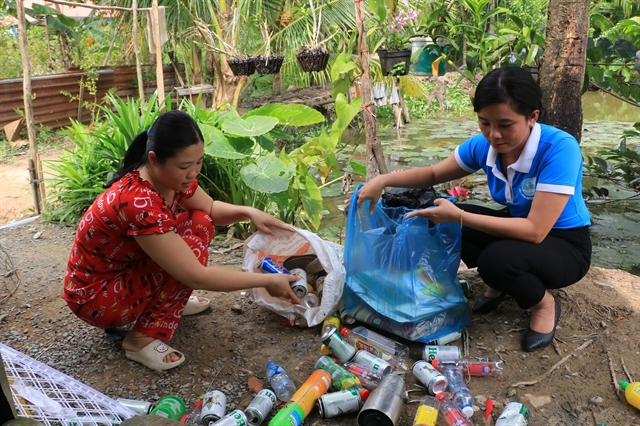

22/11/2023
The image of a woman carrying a reusable bag and some plastic containers has become familiar at a traditional market in Linh Nam Ward in Ha Noi’s Hoang Mai District.
On average, each Vietnamese household uses around 1kg of nylon bags per month. More than 80 percent of these bags are discarded after single use, with a minimal proportion being properly processed. "I bring these plastic containers to hold various types of food when buying meat or fish instead of using single-use plastic bags given by the sellers", said Mrs. Nguyen Thi Hien, a 35-year-old woman from Nam Du Street.
"I've been in the habit of using reusable bags for shopping for the past three years. The purpose of using them is primarily to protect my family's health from low-quality single-use plastic bags and also to contribute a small part to environmental protection, as plastic pollution is becoming increasingly alarming not only in our country but also in countries around the world", she said.
Mrs. Nguyen Thi Hien said that initially using reusable plastic containers for shopping surprised many people at the market, but most of them understand her intention of using them for environmental protection. The image shoppers using plastic containers while shopping hasn't been widely seen, especially at traditional markets, but she hopes it can spread to more people, contributing to raising awareness among citizens about reducing plastic waste in the environment.
Plastic pollution has become a biggest challenge for Viet Nam and many countries worldwide today. The overuse of plastic products, especially non-degradable nylon bags and single-use plastic products, has been having serious consequences on the environment, placing Viet Nam among the top 20 countries with the largest amount of waste globally and ranking fourth in the world for plastic waste discharged into the ocean, according to the Ministry of Natural Resources and Environment.
In Việt Nam, an average of about 1.8 million tonnes of plastic waste is generated annually, including over 30 billion nylon bags. On average, each Vietnamese household uses around 1kg of nylon bags per month. More than 80 per cent of these bags are discarded after single use, with a minimal proportion being properly processed.
According to statistics from the Việt Nam Plastics Association, plastic waste and nylon bags in Việt Nam account for approximately 8 percent to 12 per cent of solid household waste, but only around 11 to 12 percent of plastic waste and bags are actually recycled or reused. The majority are disposed of through landfilling, incineration, and improper waste management practices, causing harm to the environment. With the goal of reducing plastic waste in the environment, numerous projects, programmes and environmental protection campaigns have been initiated across most regions in the country.

People visit a booth displaying eco-friendly products during an event to respond to the month of action for the environment of the Ha Noi Women's Union in the movement against plastic waste
A model of waste classification at source has been implemented in Ha Noi since late 2021, starting with pilot projects in rural districts of Dong Anh and Soc Son, according to Head of the Publicity and Education Department of the Hà Nội Women's Union Hoang Thu Hong. "The pilot implementation in the two districts on the outskirts of Hà Nội has yielded significant results. As of now, waste classification at source has been rolled out in all districts of Hà Nội", said Mrs. Hoang Thu Hong.
"We have organised training sessions and introduced waste classification models at the source to all levels of women's unions. These members are the ones directly applying, guiding and mobilising local residents to participate in the programme".
According to a report from Dong Anh District, at the beginning of the project, the number of households participating was only 14 percent. By 2023, the project had expanded to 24 communes and township, with over 54,000 households participating in waste classification at the source, reaching 57 percent of total households in the locality.
"The awareness of residents regarding waste classification and treatment at the source has been raised, gradually forming a sense of responsibility in environmental protection. This has led to the application and use of organic fertilisers in farming", Mrs. Hoang Thu Hong said. "Some women have had the opportunity to start businesses from plastic waste. They produce and sell products made from collected plastic waste. They are also trained in making organic fertilisers from organic waste. We are striving to expand this waste classification model to 100 per cent of the communes in Hà Nội", she added.
Role of women
These are practical actions by women that demonstrate their significant role in natural resource management at both the household and community levels. Many studies and practical evidence have shown that women often bear the primary responsibility for daily household tasks, which significantly influences consumption, classification, and disposal of plastic waste within the family.

Households in Dong Thap Province have been classifying waste at source since 2020
Women play a vital role in household management, nurturing children, and imparting consumption habits such as not wasting water, reducing electricity consumption, limiting the use of single-use plastic products and using plastic containers. They simultaneously raise awareness about energy conservation practices, sustainable product usage, minimising use of disposable goods, and managing waste from factories, agricultural fields, and households.
According to the findings of the Vietnam National Plastic Action Partnership (NPAP) in its report “Gender equality and social inclusion (GESI) in the plastic value chain in Viet Nam", women also form the majority of informal waste collection roles, often receiving low wages and working in hazardous conditions with limited social protection and healthcare benefits. They face numerous challenges related to safe housing, sanitation, labour safety, and social protection. During their work, many informal labourers also experience issues of harassment and sexual abuse.
Both male and female workers in the waste sector encounter social prejudice, and their job value remains unrecognised by authorities and the community alike. Overall, there is a gender imbalance within waste management units, particularly with more men than women in leadership and staff positions. Women often undertake less significant tasks, receiving lower wages due to gender biases, according to the NPAP report. They lack full participation and a heard voice in policy development and implementation processes. Women's involvement and contribution in decision-making processes regarding plastic policies are not fully recognised.
On the morning of August 29th, the Vietnam Women's Union, in collaboration with the Embassy of Canada to Viet Nam and UNDP Viet Nam, organized a workshop on “Gender Equality and Social Inclusion in Plastic Waste Management”.
The participants discussed the roles of women and strategies to enhance gender equality and comprehensive development in plastic waste management at the household and community levels, emphasising the need to include gender and social inclusion issues in the joint action plan to integrate fragmented solutions into an inclusive and sustainable plastic circular economy by leveraging resources from policymakers, experts, enterprises, and development partners.
"Women are disproportionately affected by negative environmental impacts, especially impoverished women who often have limited access to land rights, education, and essential support services related to agriculture, finance, and more. This vulnerability places them at a higher risk”, said Vice President of the Vietnam Women's Union Nguyen Thi Minh Huong.
However, from another perspective, women also play a positive and pivotal role in environmental conservation. They can act as agents of change, raising awareness among other family members about consumption and waste management. “From the perspective of producers, consumers, or managers, they all play an important role in preserving and protecting the environment, protecting public health”, Mrs. Nguyen Thi Minh Huong emphasised.
According to UNDP Deputy Resident Representative Patrick Haverman, women play a crucial role in the formal and informal sectors of the collection, sorting, and recycling of plastic within households and communities. Authorities and communities should take women’s roles into account during policy formulation. “Policymakers need more research, data, or evidence on plastic, gender, and social inclusion issues to avoid any adverse impacts on women, migrants, and other vulnerable groups when implementing the Extended Producer Responsibility (EPR) policies and other relevant policies", he said.
Ambassador of Canada to Việt Nam Shawn Steil said the Government of Canada is working with its partners around the world to reduce plastic waste and pollution. Canada’s programming focuses on supporting women’s rights and livelihoods that complement efforts to transition to a more sustainable and circular plastics economy. A circular economy approach is needed to tackle how we produce, use, and dispose of plastics, and coming to grips with the growing challenges related to human health, gender equality and social inclusion”, the Ambassador said.
Đức Anh (Source: Vietnamnews.vn)
(Source: The article was published on the Environment Magazine by English No. III/2023)